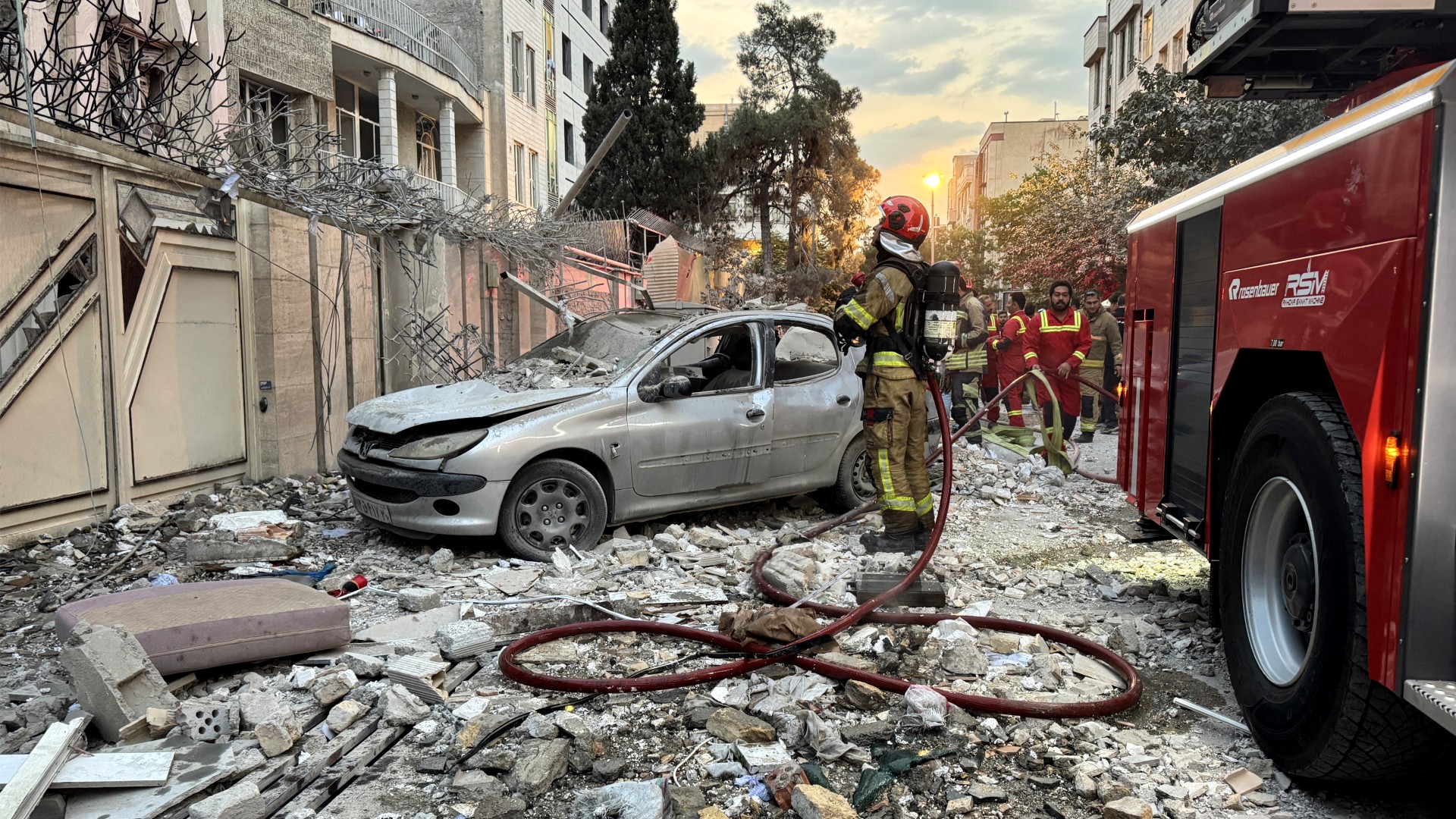How the Israel-Iran conflict broke out
Israel's strike on Iran's nuclear and missile programmes was years in the planning

A free daily email with the biggest news stories of the day – and the best features from TheWeek.com
You are now subscribed
Your newsletter sign-up was successful
Last Thursday night, the commander of Iran's Revolutionary Guard's aerospace unit, Brigadier General Amir Ali Hajizadeh, held an emergency meeting at a military base in Tehran.
Hajizadeh and his officials had been warned not to congregate in one place, said Steve Bloomfield in The Observer, owing to the risk of an imminent Israeli attack, but they assumed that any raid would still be days off. It was a fatal miscalculation.
Their bunker was one of dozens of sites targeted that night by Israeli jets, which eviscerated the top ranks of Iran's armed forces and killed some of its leading nuclear experts. Israel has since continued to pummel the country's military and nuclear sites, along with energy infrastructure. Iran has responded by firing ballistic missiles at Israel, a few of which have penetrated its Iron Dome defences, killing dozens of people.
The Week
Escape your echo chamber. Get the facts behind the news, plus analysis from multiple perspectives.

Sign up for The Week's Free Newsletters
From our morning news briefing to a weekly Good News Newsletter, get the best of The Week delivered directly to your inbox.
From our morning news briefing to a weekly Good News Newsletter, get the best of The Week delivered directly to your inbox.
Donald Trump, who had previously stressed that the US was not involved, urged Iranians to evacuate Tehran on Tuesday, and demanded the regime's "unconditional surrender". Supreme Leader Ayatollah Ali Khamenei insisted Iran would never compromise with Israel, and threatened the US with "irreparable damage".
How did Israel plan the attack on Iran?
Israel's strike on Iran's nuclear and missile programmes was years in the planning, said The Times of Israel. The operation – dubbed "Rising Lion" – involved over 200 aircraft in the opening strikes, around two-thirds of the country's combat air force. Israel had spent months smuggling precision weapons systems and commandos into Iran. Mossad agents had set up a secret drone base near Tehran. These assets enabled Israel to take out Iranian air defences and hit missile launchers as they emerged from shelters, protecting Israeli pilots and helping them establish complete dominance of the skies over Iran.
Why did Israel attack now?
The attack was carefully timed by Israel, said Lina Khatib in Prospect. "Never in its history has the Islamic Republic been weaker." Its proxy forces in Gaza and Lebanon – Hamas and Hezbollah – have both been defanged, and the fall of the Assad regime in Syria has deprived it of a key ally. Even before last week, its air defences were in a parlous state owing to earlier Israeli strikes.
Trump had set a 60-day deadline for Iran to accept a nuclear deal presented by the US. That ran out last Thursday, giving Israel a perfect "opportunity to go for the jugular". "Ever the opportunist", Israeli PM Benjamin Netanyahu seized his chance, said The Guardian. He has long wanted to attack Iran, and doing so now had the added bonus of bolstering his weak position at home. You can hardly blame Netanyahu for wanting to stop Tehran's "mad mullahs" from getting their hands on a nuclear weapon, said Paul Baldwin in the Daily Express. "Handwringers" like Keir Starmer may witter about the need for de-escalation, but "they all know Israel has done them and the world a favour".
A free daily email with the biggest news stories of the day – and the best features from TheWeek.com
Will Israel succeed?
Israel may have felt that it had no choice but to act, said The Economist, but the all-out offensive is nevertheless "a huge gamble". Launched without overt US backing, it could have all sorts of unpredictable regional and global consequences. And there's no guarantee that it will even succeed. Israeli military strikes did manage to halt the nuclear weapons programmes of both Iraq and Syria – in 1981 and 2007 respectively – but Iran's is "much more advanced and dispersed than those ever were".
It has mastered the process of enrichment and its programme may just start again in the future in a more "virulent" form. In the meantime, Israel has no clear exit strategy from this war unless the Iranian regime falls or the US gets involved with its superior bunker-busting bombs. A protracted conflict will be hard for either side to sustain, said James Shotter in the FT. While Iran is burning through its supplies of missiles, Israel's stocks of interceptors are also limited.
What will happen next?
One possibility, said Michael Burleigh in The i Paper, is that Tehran, after some face-saving strikes on Israel, accepts defeat and returns to the negotiating table with the US.
Alternatively, it may lash out in desperation and seek to block the Straits of Hormuz, choking global trade. But the conflict may just drag on at a lower level, in a "tit-for-tat forever war".
Many in Washington fear that Trump may, as he has hinted, join the bombing campaign in an effort to kill off Iran's nuclear programme once and for all, said Gideon Rachman in the FT. It would be a dangerous move. Trump promised to be a peacemaker and cut deals. Only last month, in a speech in Riyadh, he "scorned the idea that outsiders can bring positive change to the Middle East by force". It would be a "supreme irony" if he found himself "dragged into another war for regime change in the Middle East".
-
 What is the endgame in the DHS shutdown?
What is the endgame in the DHS shutdown?Today’s Big Question Democrats want to rein in ICE’s immigration crackdown
-
 ‘Poor time management isn’t just an inconvenience’
‘Poor time management isn’t just an inconvenience’Instant Opinion Opinion, comment and editorials of the day
-
 Bad Bunny’s Super Bowl: A win for unity
Bad Bunny’s Super Bowl: A win for unityFeature The global superstar's halftime show was a celebration for everyone to enjoy
-
 Munich Security Conference: a showdown between Europe and Trump?
Munich Security Conference: a showdown between Europe and Trump?Today’s Big Question Report suggests European leaders believe they can no longer rely on the US for military support – but decoupling is easier said than done
-
 What is ‘Arctic Sentry’ and will it deter Russia and China?
What is ‘Arctic Sentry’ and will it deter Russia and China?Today’s Big Question Nato considers joint operation and intelligence sharing in Arctic region, in face of Trump’s threats to seize Greenland for ‘protection’
-
 Is the Chinese embassy a national security risk?
Is the Chinese embassy a national security risk?Today’s Big Question Keir Starmer set to approve London super-complex, despite objections from MPs and security experts
-
 New START: the final US-Russia nuclear treaty about to expire
New START: the final US-Russia nuclear treaty about to expireThe Explainer The last agreement between Washington and Moscow expires within weeks
-
 Would Europe defend Greenland from US aggression?
Would Europe defend Greenland from US aggression?Today’s Big Question ‘Mildness’ of EU pushback against Trump provocation ‘illustrates the bind Europe finds itself in’
-
 Greenland, Colombia, Cuba: where is Donald Trump eyeing up next?
Greenland, Colombia, Cuba: where is Donald Trump eyeing up next?Today's Big Question Ousting Venezuela’s leader could embolden the US administration to exert its dominance elsewhere
-
 Did Trump just end the US-Europe alliance?
Did Trump just end the US-Europe alliance?Today's Big Question New US national security policy drops ‘grenade’ on Europe and should serve as ‘the mother of all wake-up calls’
-
 Trump peace deal: an offer Zelenskyy can’t refuse?
Trump peace deal: an offer Zelenskyy can’t refuse?Today’s Big Question ‘Unpalatable’ US plan may strengthen embattled Ukrainian president at home